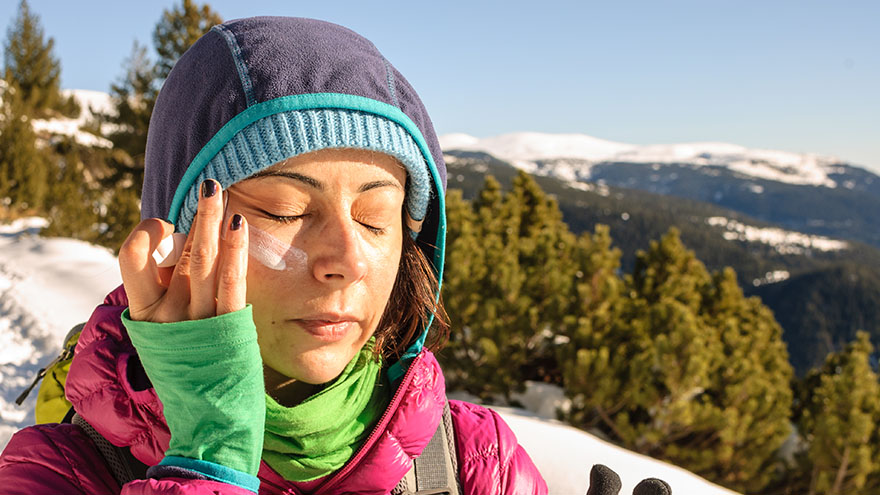Buscar
-
Prevenir el cáncer de piel Consejos de una médica
Want to protect yourself from skin damage from the sun’s harmful rays? Dr. Angela Walker, dermatologist with Renown Medical Group, shares what you can do to prevent skin cancer. What can people do to prevent skin cancer while enjoying the outdoors? There are several steps you can take to protect your skin from the sun. “I caution all of my patients to avoid the sun during the hours of 10 a.m. until 2 p.m. when UV rays are strongest. I also encourage people to wear sleeves on cooler days. And don’t forget that we still need to wear sunscreen on cloudy days! UV rays can still cause sun damage on cloudy days. Preventing skin cancer also entails wearing sunscreen of at least SPF 30 everyday. Are hats also a good idea for skin protection? Yes, of course! Choose a wide-brim hat that shades the face as well as the back of the neck for extra protection against UV rays. When it comes to identifying skin cancer, what should people watch for? We use easy-to-remember letters when checking for spots on the skin; it’s called the ABCDEs: How often should people go to a dermatologist for a full-body skin check? People with a family history of melanoma or who have already had skin cancer need to be screened at least once a year. Those who are younger and use sunscreen daily don’t need to be seen as regularly. Their primary care provider can do a yearly screening. And remember to do self-screening at home to keep an eye out for unusual looking spots. Is it best to visit a care provider with an expertise in skin with questions or concerns? Absolutely. As a dermatologist, I see a lot of people coming in with a changing mole or brown spot that looks irregular. I can assure them it’s benign or get them the treatment they need. We can even use photography to monitor skin spots and have the patient take photos at home. We also perform biopsies as needed.
-
5 consejos sencillos para el cuidado de la piel en invierno
Winter skin alert – cold temperatures can put your skin into chaos. We asked for skin tips from Heidi Nicol, an esthetician with Renown Dermatology, Laser & Skin Care. She shares how to keep your skin glowing through the frosty months ahead. 1. Re-think your shower Few things feel better on a cold day than a long, hot shower. But hot showers can lead to dry skin because they strip your skin of its natural protective oils. Avoiding them altogether is best – choose a lukewarm, or warm, shower instead. If you have an occasional hot shower, the American Academy of Dermatology (AAD) suggests keeping it at five to ten minutes. Nicol recommends using a gentle cleanser and avoid using too much. Moisturizing after a shower or bath while your skin is still damp is also a must. Slathering on your favorite lotion helps your skin hold on to precious moisture. 2. Stay away from smoke and fire Although sitting close to a roaring fireplace can feel good, it is drying to your skin. Smoking and exposure to smoke also harms your skin. Smoking reduces healthy blood flow to the skin. This also causes your skin to wrinkle faster, making you looker older. Additionally your skin heals much slower if you smoke. 3. Consider a humidifier Cranking up the thermostat dries out indoor air. Skin is our largest organ, and in general, heat is very drying to your skin. To clarify, over time dry air degrades your skin’s natural moisture (lipid) barrier leading to flaking, peeling and cracking. Your skin can overcompensate for the dryness by producing even more oil. In other words it is possible for your skin to be both oily and dehydrated at the same time. Even oily skin needs a daily lightweight, non-pore clogging moisturizer. 4. Use SPF daily The sun’s rays damage your skin even on cloudy days. Sunlight contains UVB (burning) and UVA (aging) rays. Although UVB rays are less strong in the winter, the UVA rays are same strength all year. And snow can reflect almost 90% of UV radiation. With this in mind make sure you have suitable skin and eye protection when going outdoors. 5. Take care of your hands and feet Don't forget your fingers and toes when moisturizing. These areas tend to be drier than other parts of the body. Gloves help to protect hands from winter weather and lock in moisture. Similarly, putting lotion on your feet before your socks will keep them your skin from flaking and cracking. Follow the tips above to make sure your skin is at its best, despite the winter weather.
-
Resfrío y gripe 101: lo que necesita saber
Due to the stubborn nature of this year’s flu season, Hometown Health and Renown Health are adding additional flu shot events. Learn more about being protected and how to weather this year’s cold and flu season. Typical for this time of year, Renown is currently seeing a rise in patients with flu-like symptoms and other winter illnesses. To help protect the community, flu shots will be offered at the dates and times listed below: Friday, Feb. 23, 10 a.m. to noon Wednesday, Feb. 28, 5-7 p.m. Both flu shot events will be held at in the Hometown Health building located at 10315 Professional Circle, Reno NV 89521. These are walk-in flu shot events — no appointment required. No out-of-pocket costs for Medicare beneficiaries (Part B), Senior Care Plus members and Hometown Health fully insured HMO and PPO plans. Please bring your insurance card and current ID. Without a qualifying plan, the individual cost is $35. If you have questions regarding these flu shot events, please contact Hometown Health Wellness Services at 775-982-5433. And to help you weather the intense cold and flu season this year, we asked Kathleen Burns, an advance practice registered nurse at Renown Health, about flu prevention and how to know the difference between the flu virus and the common cold. How do you prevent the seasonal flu? The annual flu vaccine is truly the best form of protection to help prevent the spread of the flu. Even if you do get the flu after being vaccinated, your symptoms will be lessened. Flu vaccines are still available in the community, including health providers at Renown Medical Group. Call 775-982-5000 to make an appointment. Although they are not substitutes for the flu vaccine, simple preventative actions can do a lot to help slow the spread of the virus, including: Covering your mouth when coughing and staying away from people who are coughing. Washing your hands often. If you have the flu, stay home. If you have the flu and need to go out, including a visit to the doctor’s office, wear a protective mask. Other precautionary measures include cleaning shared spaces and avoiding shared utensils and drinks. Who should get the flu shot? Almost everyone. The Centers for Disease Control and Prevention recommends a yearly flu vaccine for everyone 6 months of age and older as the first and most important step in protecting against influenza. Different flu shots are approved for people of different ages, but there are flu shots that are approved for use in people as young as 6 months of age and up. Flu shots are approved for use in pregnant women and people with chronic health conditions. Bottom line: Your best chance of avoiding the flu this season is to get your flu vaccine. How do you know if it’s the flu or a cold? The flu and the common cold have similar symptoms and it can be difficult to tell the difference between the two. Your healthcare provider can give you a test within the first few days of your illness to determine whether or not you have the flu. In general, the flu is worse than the common cold. Symptoms such as fever, body aches, fatigue and cough are more common and intense with the flu. People with colds are more likely to have a runny or stuffy nose. Flu symptoms include: A 100 degree or higher fever or feeling feverish (not everyone with the flu has a fever) A cough and/or sore throat A runny or stuffy nose Headaches and/or body aches Chills Fatigue Nausea, vomiting, and/or diarrhea (most common in children) Does washing your hands really help prevent sickness like cold and flu? Yes. Again, the single best way to prevent seasonal flu is to get vaccinated each year, but good health habits like washing your hands often can help stop the spread of germs and prevent illnesses like the cold and flu. The proper way to wash your hands is to wet them with clean, running water (warm or cold) and apply soap. Lather your hands by rubbing them together. Be sure to lather the backs of your hands, between your fingers and under your nails. Scrub your hands for at least 20 seconds. If you need a timer, hum the “Happy Birthday” song from beginning to end twice. Rinse your hands well and dry them using a clean towel or air dry them. If soap and water are unavailable, use an alcohol-based hand sanitizer that contains at least 60 percent alcohol to clean hands. Other good health habits include covering your cough; avoiding close contact with people who are sick; staying home when you are sick; and practicing a healthy lifestyle by getting plenty of sleep, being physically active, drinking plenty of fluids and eating nutritious food.


